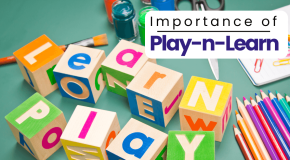From the moment children start becoming autonomous, their inherent nature of exploring the world around them springs into action. Children are spontaneous, dynamic, curious, restless, imaginative, creative and seek novelty in their own way in any given environment. This significantly enhances their cognitive, emotional, and social skills. These traits set the ball rolling for the developmental years that follow. From time immemorial, irrespective of whether children are born into privilege, or grow up in challenging circumstances, across different communities, they have an innate ability to own their environment and devise unique and innovative ways to keep themselves engaged and find enjoyment. As they grow up, this resilient nature usually enables them to not only enjoy the simplest pleasures of life, but also derive a sense of satisfaction from a myriad of experiences.
The quality and expectations from life have changed in a phenomenal way following urbanization particularly in the last few decades. Connectivity is like never before where people can reach out to each other in no time. From learning to wait patiently we acclimatized to the instant, fast, and often easy; impatience and restlessness came out as two of the byproducts. In effect, this paradigm shift also silently gave rise to a few concerns without us realizing, particularly in children as they are of an impressionable age. A trip down memory lane will certainly rekindle fond memories from our childhood years (in most cases), where along with a certain amount of structure, hands on, free and unstructured play was our staple.
Most of us still fondly remember the connections that we made and experiences that we had. Our summer and winter vacations were not about learning coding, robotics, a foreign language, or our parents frantically trying to look for summer camps filled with activities which always promised learning and fun galore largely to keep boredom at bay. Vacations and free time were certainly about children enjoying themselves and taking a break from their regular routine, travelling if there is the opportunity to do so, perhaps learning one or two skills which interested the child. Vacations and free time should be about children allowing their minds to wander, dream, observe and absorb their surroundings. However, it is important to note that experiencing a certain amount of boredom from time to time is also healthy. This is when children become imaginative, creative and also find ways to entertain themselves. Continuously making efforts to structure a child’s day, looking for fillers when they have free time takes away the pleasure of “just being” sometimes.
Registered psychologist, speaker, parent educator and author of the bestselling book ‘Discipline without Damage’, Dr. Vanessa Lapointe says, “Children need to sit in their own boredom for the world to become quiet enough that they can hear themselves”.
The idea of new, exciting, fun, happening and living the moment has been one of the most popular mantras for some time now. From time to time, most human beings need small doses of these ingredients to break monotony and infuse themselves with a fresh burst of energy. But in the last decade or so, the avenues to seek pleasure in varied ways has grown in leaps and bounds and children happen to be the most gullible not knowing when and where to stop and exercise self-control. Most of our children are growing up in the era of gamified childhood (a phrase coined by the National American Academy of Paediatrics in New Orleans) rather than free play and the pandemic further escalated this situation by forcing children to stay indoors. Overstimulation with immediate and constant gratification often end up deepening the vacuum making children uncomfortable when they have nothing to do. In today’s day and age, particularly in nuclear families where both the parents are working, a lot of people find relief in structuring the child’s day with scheduled activities and while doing so technology comes handy. Today, it is a growing belief that developing a healthy relationship with technology is important to keep boredom in check.
While a child or a teenager may exhibit intermittent periods of mood swings and crankiness complaining about boredom, it is important though a tad bit challenging to understand and allow the child to be and find his or her own way to deal with this boredom. Sometimes when we are reeling with a splitting headache or insomnia due to over exhaustion and stress, popping a pill to provide some immediate relief doesn’t address the core issue. Similarly buying peace time with stop gap measures to make the child feel stimulated and fulfilled can in fact create a bigger void. Interestingly, research suggests that boredom has many benefits for the child. A few of them are listed below:
- Boredom enables a child to remain in his or her own bubble for some time and get in touch with one’s own self. When a child spends a certain amount of time in self-reflection, it enables them to know and understand themselves better. It also creates an inner calm. The child’s brain often takes the lead and he or she becomes explorative. Given the opportunity, children can be imaginative and come up with unique and out of the box ideas to engage themselves. So sometimes, boredom can act as a stimulus which propels a child to do something he or she would not have done otherwise.
- Most children have some area of strength and with time, they find their niche. A certain degree of experimenting and a few let downs enable them to try out something different and enhances their problem-solving ability. Warding off boredom on one’s own is also an essential life skill which helps to establish a fair degree of grit and confidence to be experimental. This is a crucial step towards establishing their own identity.
- After some initial teething trouble, boredom enables a child to become autonomous and regulate their emotions. A constant need and dependence on external stimulus to keep oneself engaged and entertained can be tiring and after a point one may hit a roadblock too. Only when the child is left in his or her own space and volition, the child’s imagination springs into action. The child may be able to convert this boredom into an opportunity and we adults need to have some perseverance in allowing children the time and space to do so. Very often looking for ways to keep children engaged and “happy” is just not for their own inner peace but ours too. It is possible that they may stumble and be disappointed. They may also create a mess. Those of us who are meticulous about tidiness and believe that raising a child well means teaching him or her to be orderly may need to reconsider our thought.
- One positive experience can immensely bolster children’s confidence level and open many doors as they become open to taking more risks. We, as adults, should not be afraid of our children’s failures or disappointments but rather should motivate them to get up and try again.
An idle mind may not always be a devil’s workshop contrary to the old saying. The mind is not wired to always function on an autopilot mode. Today, there is a lot of information overload from different sources and our thinking faculties also need to unwind from time to time to find peace and wander.

Ms. Moutushi Choudhury
Behavioral Counselor
“It doesn’t matter what you have but what you are” is my innate belief in life. Having completed my post-graduation in human development and post graduate diploma in psychological counselling, I worked extensively in the development sector in the fields on gender, substance abuse, HIV/AIDS and mental health. This is when I felt a deep need to connect with people on an emotional level and hence, I made a deeper foray into the world of counselling. Books, music, travelling and friends are my elixir! At CHIREC, working with the adolescent age group has been an extremely dynamic and exhilarating experience as there are new challenges each day!





